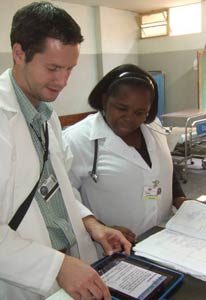Fogarty informatics projects mature, form networks
August 2010 | Volume 9, Issue 4

Photo courtesy Dr. Eliah Aronoff-Spencer
Several of Fogarty’s informatics research
training projects are reaching new levels
of maturity, expanding to form regional
networks, leveraging tools and hard-
earned lessons to benefit growing
numbers of developing country
researchers. Pictured above, medical
residents at Maputo Central Hospital
in Mozambique
use an iPad.
Several of Fogarty’s informatics projects are reaching new levels of maturity, expanding to form regional networks and, leveraging tools and hard-earned lessons to benefit additional developing country researchers. A program in Brazil is sharing its materials with Mozambique, where Portuguese is also the national language. Researchers in Peru are building a Latin American training network and a university in South Africa is forming a consortium to strengthen biomedical informatics throughout Africa.
“These projects are adding depth and sophistication, growing beyond their original purposes and geography,” says Fogarty informatics program officer Dr. Flora Katz, who credits the grantees with “educating university and government officials about the power of informatics, showing its value against many competing priorities.”
Begun in 1998, Fogarty’s Informatics Training for Global Health program is designed to build informatics capacity in developing countries through training that is integrated into ongoing research projects.
Brazil reaches Mozambique with shared language
In Brazil, the Fogarty grant helped develop the country’s first doctoral program in bioinformatics. That curriculum is now being offered to researchers in low-resource areas of the country and will soon be made available to scientists in Mozambique.
“Once we had abundant materials in Portuguese, we wanted to share with another Portuguese-speaking country. Mozambique was chosen because it has a medical school with the capacity for rigorous research,” says Dr. Lucila Ohno-Machado, principal investigator.
Today, using the iTouch, iPad and 99 cent applications, medical students in Mozambique are diagnosing more patients more accurately than ever before. Previously, it was not uncommon for patients to be treated and released from the hospital without a diagnosis. But the expertise to leverage the data flow is often lacking, something Ohno-Machado is hoping to address.
Peru shares expertise regionally, globally
Having developed a critical mass of researchers with informatics expertise in Peru, the Fogarty project at the University of Peru Cayetano Heredia is creating a hub to share that knowledge across the Andean region, with a focus on Colombia, Ecuador and Peru.
Called QUIPU, for the ancient Incan record keeping system, the collaboration will provide certificate, master’s and doctoral level informatics programs. It will also support competitive awards for mentored research, a regional conference and internet-based courses to expand its reach.
“Before 1999, training or research activities involving medical or health informatics were almost non-existent in Peru,” says Dr. Patricia Garcia, who helms the effort, which has recently provided informatics training to scientists as far away as Thailand and Africa.
Scaling up through a Pan-African collaboration
Rather than continuing to bring scientists from across Africa to Durban to gain informatics expertise - which is expensive and has the negative effect of removing skilled personnel from their work place - the University of KwaZulu-Natal is using its Fogarty grant to form a Pan-African consortium that will make training available at multiple sites.
Led by Dr. Maurice Mars, this distributed learning partnership will use video conferences and podcasts to share curricula and provide advanced informatics training to about 100 scientists over five years. The need is great, he says. “There are not enough doctors in Africa with strong computer backgrounds.”
With scarce human resources, each university cannot offer every course. Instead, they will share core curricula but also develop additional modules tailored to local relevance
Mars says he hopes to convince the continent’s health ministers to add informatics expertise to their departments. “My long-term goal is have informatics incorporated into the general education in sub-Saharan Africa.”
Ten years of international collaboration in biomedical informatics and beyond: the AMAUTA program in Peru. Walter H. Curioso, Sherrilynne Fuller, Particia Garcia, King K. Holmes and Ann Marie Kimball. J. Am. Med. Inform. Assoc. 2010; 17:477-480.
To view Adobe PDF files,
download current, free accessible plug-ins from Adobe's website.
Related Fogarty Programs